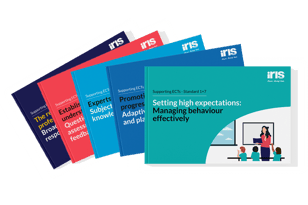At IRIS Connect we have been, and continue to be, closely involved in the Early Career Framework (ECF), from a precursor project called Accelerate, through to national roll-out in conjunction with the Education Development Trust.
As part of our continued work with the EdDevTrust, all early career teachers (ECTs) and mentors enrolled on their ECF programme will get free access to our video tools to support coaching, mentoring, reflection, and enhanced support from their delivery providers.
In this blog, our Director of Education, Haili Hughes shares her thoughts and mentoring expertise on the ECF as a whole. She also describes the unique and powerful ways video collaboration technologies can support early career teachers, whichever ECF provider you are working with.
A new path to retention
The best available evidence indicates that ‘quality first teaching’ is the most important tool schools have to improve outcomes for their pupils (EEF, 2021). Yet, developing high-quality pedagogy is a challenge when one in three teachers are leaving the profession within five years (DfE, 2019). Within the UK, the Department for Education has responded to the challenge by introducing greater support for new teachers via the Early Career Framework which has been launched as part of their ‘Recruitment and Retention Strategy.’

What is the Early Career Framework?
The Early Career Framework is an evidence base which underpins a new entitlement for teachers in their first two years of practice, detailing what all novice teachers should learn about and learn how to do. The fully funded and structured entitlement not only aims to improve the training and development opportunities for teachers, but also intends to ensure all mentors are well trained and can support early career teachers on their developmental trajectory. As part of the reforms, school-based mentors will also receive training to ensure that they are familiar with the evidence underpinning the framework and are able to model and demonstrate what the research looks like in practical, subject-specific pedagogical terms. Therefore, the role of mentor has now shifted to become more of an expert colleague, who provides examples, models strategies and guides their mentee to become an effective practitioner by embedding evidence-based practice right from the start of their career.
School leaders: How can you best support mentors?
In order for mentors to be successful, there needs to be a culture of mentoring and coaching in the school - at all levels. As Professor Rachel Lofthouse has stated, ‘For too long, mentoring has been a Cinderella profession, where mentors have worked incredibly hard and often had their contribution overlooked’ (NACE, 21).
The support of the Senior Leadership Team will ensure that mentoring is at the forefront of priorities for the school and that ECTs and their mentors feel heard and supported. Here are four practical tips to help:
- Ensure your best teachers are mentors. They will need to model the excellent practice that new teachers are striving for. You can work closely with your Early Career Framework lead to identify who these colleagues are and celebrate their status in the school.
- Time is precious. In order for mentors to do their difficult job well and support ECTs properly, they need to be allocated time to have the vital professional discussions with their mentees and also to complete the reading and research which will inform their guidance. IRIS Connect can help with providing easier opportunities for peer to peer observation, but time could also be allocated in your CPD calendar for mentors to hone their craft.
- Check in with your ECT. As well as support from their mentors and departments, a friendly word and interaction with one of the Senior Leadership Team can not only motivate them but will also make them feel much more part of the school - this can make all the difference after a challenging week.
- Dovetail CPD so that there is a natural bridge between the training they received at ITE level with the Core Content Framework and the provision they receive as an ECT under the ECF. This will promote clarity and avoid confusion as well as encouraging great habits early on in their career.
Cognitive apprenticeship: Making thinking visible
Teaching is a highly complex profession, which involves mastery of a wide range of cognitive skills and strategies in order to teach effectively. These skills, such as methods of instruction, can sometimes seem abstract and unachievable to a novice, who may find it difficult to understand how to improve their teaching and what steps to take. Here the model of cognitive apprenticeship is particularly useful, as it aims to make thinking visible through a process of observation and guidance, leading to independent performance with scaffolds, before performance is articulated, analysed and reflected upon. This model of learning is common in other professions and indeed, has been fundamental to the human race. Consider if you will, the first time homosapiens discovered how to make fire; the skill was transferred by modelling, observation and discussion.
One of the key aspects of cognitive apprenticeship is making the metacognitive steps in a strategy explicit to a novice, so that the processes involved are clear. When the novice then rehearses the same strategies, they can then rehearse the process themselves, making their thinking visible to the coach. Not only does this method place less demand on the capabilities of working memory (Sweller, 2005), it also combines instructional explanations with worked examples so that learning is not inhibited when it comes to the independent practising phase (Chi et al., 1994).
When a doctor trains, they don't only spend time researching and studying at university, they also spend a number of years observing more expert colleagues working in the field. Teachers need to do this too. While working in the small-scale, low stakes environment of the university, the steps and procedures a trainee doctor needs to take could seem abstract. Yet the years spent practicing and observing, coupled with expert guidance of what they are doing as they do it, enables novices to create a mental model, where they can articulate and explicate their own knowledge through some guided practice. Of course, teachers are not saving lives, but some might argue that their roles are just as high stakes, as they are helping to build and shape the futures of young people. This is why it is so vital that mentors and those responsible for early career teachers’ development provide opportunities to rehearse and discuss their learning. However, in the crowded, dynamic classroom environment this can be a challenge, which is why video technologies can be so important to this process. There is no need to describe what happened in the classroom; the lesson can be recorded, paused and then discussed, with contextual dialogue and explanations, giving the opportunity for corrective feedback and a deeper level of reflection.
Another approach in the evolving science of teacher expertise is implementing deliberate practice to achieve mastery, and the use of video technologies are a perfect tool to facilitate this process. In the Deans for Impact paper, ‘Practice with Purpose’ (2016), the principles of deliberate practice are linked with the practical aspects of teacher preparation and development as it is proposed that purposeful practice can maximise improvement on the path to mastery. By providing early career teachers with the opportunity to practise strategies purposefully, in low stakes environments, their pedagogy can become much more highly developed. The more teachers engage in quality deliberate practice, the greater our capabilities become.
How school leaders and mentors can support the development of ECTs
There are seven key features of deliberate practice and five of these principles are especially relevant for school leaders and mentors who are developing early career teachers (Deans for Impact, 2016):
- Pushing beyond the comfort zone
- Working towards well-defined, specific goals
- Focusing with intent on practice activities
- Receiving and responding to high-quality feedback
- Developing a mental model of expertise
Each of these principles are perfectly facilitated by video technology as it enables a higher frequency of feedback by reducing the unit cost of the observation/dialogue cycle. Video also enables an early career teacher to ‘feedback to self’ as their expertise emerges, through targeted reflection. Furthermore, targets can become much more specific and defined, as the coachee can request feedback and direct the attention of their mentor/coach to particular aspects of the teaching they want to develop.
Deliberate practice and cognitive apprenticeships both have an integral role in instructional coaching models as they support the forming of effective habits. In research by Kraft, Blazar and Hogan (2018), instructional coaching was found to have a bigger impact on student outcomes than any other form of Continuous Professional Development (CPD). Part of the success of an instructional coaching approach is to use deliberate practice and combine worked examples with instructional explanations. By doing this, coaches/mentors can help a novice teacher develop new habits through a cycle of granular target setting, modelling, guided practice, observation of independent practice and reflection cycle. If these habits are formulated and rehearsed in more controlled, low stakes environments, the working memory of early career teachers is then freed up to give them the space to manage more complex tasks. The earlier the better, as teacher development can be constrained by allowing undesirable classroom habits to become embedded. Research by Hobbiss, Sims and Allen (2020) revealed that over time, teachers lose a conscious awareness of their actions, making it much more difficult to change them. The instructional coaching pathway in IRIS Connect’s ‘Mentor Support Programme’ will support school leaders to help their mentors in articulating the what, why and how of excellent classroom practice, so that the gaps between research and pedagogy can be bridged and pupil outcomes improved.
Video technology is not only a great tool for moving a novice teacher from A to B but it can also help equip them with the skills needed to sustain their growth throughout their teaching career. Once the early career teacher moves away from the more novice domain in their second year, it enables them to embark on a process of more independent reflection and target setting. By continuing to effectively reflect upon learning needs and their own teaching, they can identify areas for development and work with others to progress, adapt and refine their practice.
A practical guide to the ECF for mentors: How can I bring the best out of my mentee?
The Early Career Framework is constructed around the Teacher Standards, so there is a continuity from Initial Teacher Education (ITE) and the requirements of the Core Content Framework and a wider link to the new suite of National Professional Qualifications. However, there is no requirement to collect and assess evidence against the ECF document; instead it should act as a framework to support the minimum entitlement of what and how early career teachers should be developed.
With its eight standards it is incredibly comprehensive and, as mentors are always advice rich and time poor, we have provided some hints and tips for how mentors can best utilise the recommendations in the ECF. These consist of a series of concise, actionable guides which will be made available as they become timely and relevant to each phase of the Early Career Framework. Download the first of these guides below and receive updates as the following guides are released.
 Download your practical guides here:
Download your practical guides here:


Leave a comment:
Get blog notifications
Keep up to date with our latest professional learning blogs.